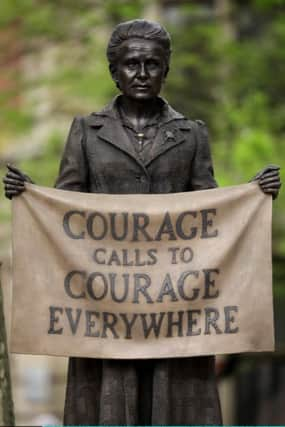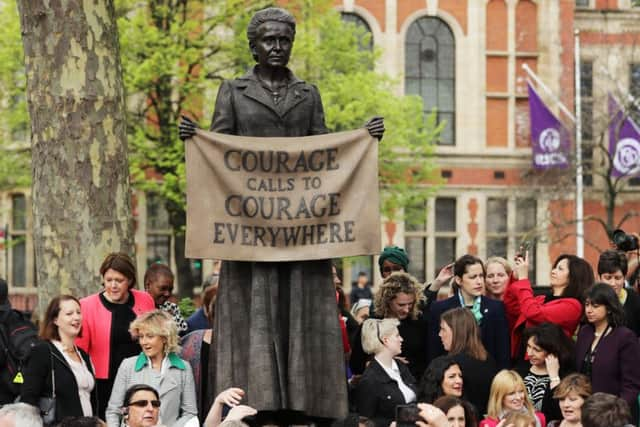Suffragist statue reminder of '˜absence' of memorials to Scots women


There were celebrations in London today at the unveiling of the bronze casting in honour of suffragist leader, Millicent Fawcett, a tireless campaigner for women’s right to vote during the early 20th century.
Speaking at the ceremony, Prime Minister Theresa May said the statue would provide inspiration for future generations, while London Mayor Sadiq Khan said the “historic day” represented the first steps towards ensuring women are properly represented in Britain’s public spaces.
Advertisement
Hide AdAdvertisement
Hide AdLast month, a statue to Mary Barbour, a prominent campaigner in Glasgow during the 1915 Rent Strikes, was unveiled in Govan to coincide with International Women’s Day.


However, organisations promoting and celebrating the achievements of women throughout history said more could be done.
Sue John, enterprise development manager at Glasgow Women’s Library, said occasions such as today’s unveiling sparked renewed debate about the lack of memorials to women. The issue, she said, remained problematic,
“Clearly there is a palpable absence of Scotland’s great women in our civic landscapes, where our great men are visibly, often triumphantly, celebrated through statues, buildings and street names,” she said.
“But this is part of a much broader issue of women having been routinely written out of history more generally, and the lack of memorials is one symptom of this.”


She added: ”It’s important that women are written back in to history, and that there are visible manifestations of their achievements because there are consequences to their absence.”
Ms John said she had “mixed feelings” about statues being considered the only suitable form of commemoration, describing it as a “monolithic form” which felt “outdated and unimaginative.”
Lynn Abrams, professor of modern history at the University of Glasgow and a member of the steering committee of Women’s History Scotland, agreed that statues had a “very particular kind of meaning” in British society, and that some people took issue with them.
Advertisement
Hide AdAdvertisement
Hide AdShe pointed to the Mapping Memorials to Women in Scotland project - a collaboration between Women’s History Scotland, the Glasgow Women’s Library, and Girlguiding Scotland - which has collated a map of hundreds of memorials around Scotland.
“There are traditional plaques and statues, but there also the likes of benches and stained glass windows,” Ms Abrams said.
“People should walk down their street and realise what’s out there. There’s a huge variety of memorials to women.”
The statue to Fawcett, the work of Turner Prize winning artist, Gillian Wearing, shows her holding a banner which reads: ‘Courage calls to courage everywhere’.
The line is taken from a speech made by Fawcett after suffragette Emily Wilding Davison was killed after throwing herself under King George V’s horse at the 1913 Epsom Derby.